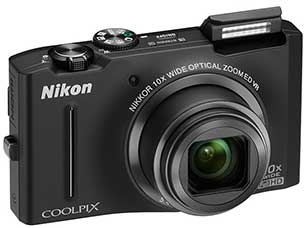Digital photographers are always faced with a choice: compact or DSLR. The line between the two continues to blur, as there are now a number of mega-zoom compact cameras, with 30x, 35x, or even 36x lenses. They may be called compacts, but they’re almost as large and bulky to carry as a true DSLR. If you still want compactness and don’t require mega-zoom capabilities, then the Nikon Coolpix S8100 makes the choice somewhat easier, at just more than an inch thick(read our very detailed review of Nikon Coolpix P1000 digital camera which has the biggest zoom). It retains many of the S8000’s features: 30–300mm equivalent, stabilized zoom lens and 3.0" LCD. The S8100 has been built with a 12-megapixel, backside-illumination CMOS sensor instead of the 8000's 14-megapixel CCD.

The Nikon Coolpix S8100 is stylish enough if that matters to you, but you should be more enthused by its solid feel, which is not all like a typically flimsy point-and-shoot camera. The grip may not be large, but you’ll find the textured thumb rest on the back and a slightly raised bar on the front cleverly positioned, so you can hold the camera easily and securely. The rear of the camera includes a three-inch LCD monitor, with an exceptional dot resolution of 921,600, and a series of controls that should be very familiar if you have experience with these kinds of cameras. The top of the Nikon S8100 is the location of a pop-up flash, stereo microphones, on/off button and mode dial, which clicks into place with some authority.
The lens of the Nikon S8100 is a 10x Nikkor ED glass optical zoom lens. The 30–300mm is more than adequate for wide landscapes and casual portraits, and bringing distant subjects closer. The lens has a maximum aperture range of f/3.5–5.6, with 10 elements in 8 groups and a two-step neutral density (ND) filter. You can move within 0.4 inches of objects with the macro. It’s gratifying to see that Nikon included its VR, or Vibration Reduction, technology in a four-way configuration that includes optical image stabilization.
Controls are quite basic on the Nikon S8100, with few manual adjustments, just exposure compensation, white balance, ISO, vividness and hue. Focus, aperture and shutter speed is automatic when you select a specific scene mode. Most of the time, you’ll be using the zoom toggle switch, which you can easily change throughout the 10x range without any mechanical hesitation.
Although this is a point-and-click, the mode dial offers more than the typical choices: auto, continuous, scene, scene auto selector and subject tracking. You’ll also have the flexibility of selecting night landscape, night portrait and backlighting modes. For example, you can shoot High-Dynamic Range, or HDR, in the backlighting mode. Continuous mode also includes quite a variety, including continuous H, L, pre-shooting cache, sports continuous, Nikon's Best Shot Selector and multi-shot 16. Some of these capabilities are a bit limited, such as the sports-continuous mode that may take as many as 54 frames at 1/120th of second, but they're just 1-megapixel photos.
Of course, as a casual digital photographer, you might immediately gravitate to the S8100’s movie mode, but don’t expect the quality of an AVCHD model shooting at 24 Mbps. You can shoot Full HD, 1,920 x 1,080 videos at 30 frames per second (fps), in the MOVE format (MPEG-4 AVC H.264 codec). This doesn’t compare with certain Sony and Panasonic digicams that shoot AVCHD 1080i at 60 fps. Despite those limitations, the S8100’s video reproduces color well and the stereo audio is a better-than-average feature.
If you want a handy compact that fits easily in your pocket and can be put into action quickly, then the Nikon Coolpix S8100 is an excellent choice. From an objective perspective, it does almost as much as you can expect from a pocket zoom with adequate move-making capabilities.
Feel free to discuss your thoughts in our Nikon photography forum